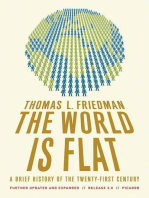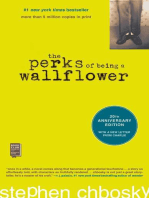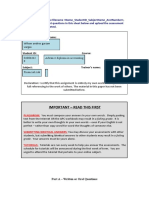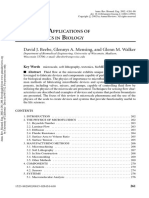0 ratings0% found this document useful (0 votes)
2K viewsCM Grosso Letter To Rep. Chaffetz On D.C. Vouchers
CM Grosso Letter To Rep. Chaffetz On D.C. Vouchers
Uploaded by
Team_GrossoLetter to House of Representatives Committee on Oversight & Government Reform from D.C. Council Education Committee Chairperson David Grosso and six of his colleagues opposing expansion of the Congressionally-imposed voucher program in the District of Columbia.
Copyright:
© All Rights Reserved
Available Formats
Download as PDF or read online from Scribd
CM Grosso Letter To Rep. Chaffetz On D.C. Vouchers
CM Grosso Letter To Rep. Chaffetz On D.C. Vouchers
Uploaded by
Team_Grosso0 ratings0% found this document useful (0 votes)
2K views3 pagesLetter to House of Representatives Committee on Oversight & Government Reform from D.C. Council Education Committee Chairperson David Grosso and six of his colleagues opposing expansion of the Congressionally-imposed voucher program in the District of Columbia.
Original Title
CM Grosso Letter to Rep. Chaffetz on D.C. Vouchers
Copyright
© © All Rights Reserved
Available Formats
PDF or read online from Scribd
Share this document
Did you find this document useful?
Is this content inappropriate?
Letter to House of Representatives Committee on Oversight & Government Reform from D.C. Council Education Committee Chairperson David Grosso and six of his colleagues opposing expansion of the Congressionally-imposed voucher program in the District of Columbia.
Copyright:
© All Rights Reserved
Available Formats
Download as PDF or read online from Scribd
Download as pdf
0 ratings0% found this document useful (0 votes)
2K views3 pagesCM Grosso Letter To Rep. Chaffetz On D.C. Vouchers
CM Grosso Letter To Rep. Chaffetz On D.C. Vouchers
Uploaded by
Team_GrossoLetter to House of Representatives Committee on Oversight & Government Reform from D.C. Council Education Committee Chairperson David Grosso and six of his colleagues opposing expansion of the Congressionally-imposed voucher program in the District of Columbia.
Copyright:
© All Rights Reserved
Available Formats
Download as PDF or read online from Scribd
Download as pdf
You are on page 1of 3
COUNCIL OF THE DISTRICT OF COLUMBIA
‘THE JOHN A. WILSON BUILDING
1350 PENNSYLVANIA AVENUE, NW.
WASHINGTON, D.C. 20004
March 7, 2017
‘The Honorable Jason Chaffetz
Chairperson, Committee on Oversight & Government Reform
United States House of Representatives
2236 Rayburn Office Building
Washington, DC 20515
Chairperson Chatfetz:
It has come to our attention that there will be a mark-up of reauthorization of the SOAR
Act tomorrow, March 8, 2017. We write as locally elected officials to express our staunch
opposition to any expansion of the federally funded school voucher program in the District of
Columbia. Rather, the voucher program should be phased out because participation in the
program and similar initiatives has not only failed to improve students’ academic performance,
but worsened it, as found in a series of recent studies. We appreciate your interest in providing
support to public education for our constituents, but we strongly believe that financial resources
should be invested in the existing public education system — both public schools and public
charter schools ~ rather than diverted to private schools,
Although we believe that students who are already receiving a voucher should have the
opportunity to maintain and use that voucher through graduation from high school, we do not
support expansion of the program or investments for new students. The District of Columbia
devotes considerable funds to public education, and our local policies promote choice for
parents. Over the past decade, the quality of public education has increased and continues to rise
as a result of reforms and targeted investments. Families can choose from an array of
educational institutions based on publicly available performance metrics, both within the D.C.
Public Schools system and among the many public charter schools. Our successes allow parents
real choices — more than parents in any other locality through transparent performance metrics
and a robust school lottery.
‘We support the phase out of the voucher program. Multiple U.S. Department of
Education reports indicate that the program has not lived up to its original goals.’ In fact, recent
studies from voucher programs in Ohio", Indiana", and Louisiana’* show that public school
students who received vouchers to attend private schools scored lower on reading and math
assessments. These studies along with two troubling Government Accountability Office reports
have also revealed that many of the students in the District of Columbia participating in the
voucher program atiend private schools with fewer resources and lower standards than our public
schools.’ The evidence is clear that the use of vouchers has no statistically significant impact on
overall student achievement in math or reading,
We have serious concerns about using government funds to send our students to private
schools that do not have to adhere to the same standards and accountability as do public and
public charter schools. For example, private religious schools, which 80% of students with
vouchers attend, operate outside the non-disctimination provisions of the D.C. Human Rights
Act. Moreover, the voucher proposal is inequitable: if fully funded, the authorization would
provide many more dollars per student for vouchers than is allocated per student in public
schools and public charter schools.
We call on you to respect the wishes of the District's elected officials on the
quintessentially local matter of education as you consider this issue.
Sincerely,
David Grosso Anita Zp~
D.C. Council, At-Large D.C. Council, At-Large
ae? Committee on Education Member, Committee on Education
ifles All Trayon WMte, Sr.
D.C. Council, Ward 6 D.C. Council, Ward 8
Member, Committee on Education Member, Committee on Education
Ew uA Vincent C. Gray
D.C. Counéil, Ward 2 D.C. Council, Ward
UN adeaw—
amie K, Nadeau lissa Silverman
D.C. Council, Ward 1 D.C. Council, At-Large
U.S. Department of Education, Evaluation of the DC Opportunity Scholarship: Final Report. June 2010 NCEE
2010-4018. Institute of Education Sciences atthe National Center for Education Evaluation and Regional
Assistance. See httpsiies.ed.gov/ncee/pubs/20104018/pdt/20104018.pdl.
* Thomas P. Fordham Institute, Foglio, David and Karbownik, Krysztof, Evaluation of Ohio's EdChoice: Selection,
Competition, and Performance Ethics. uly 2016, See hitps://edex:s3-us-west-
.amazonaws.com/publication/pdfs/FORDHAM%20Ed%20Choice%20Bvaluation®20Report_online%20edition.péf
® Brookings Institute, Evidence Speaks Reports. Dynarski, Matt, On Negative Effects of Vouchers Vol.1, #18 May
26, 2016. See bitps:/iwww.brookings.edu/wp-content/uploads/2016/07/vouchers-end-test-scores.paf.
* Education Research Alliance for New Orleans, Mills, Jonathan N., Egalite, Anna J., and Wolf, Patick J., How was
‘the Louisiana Scholarship Program Affected Students? A Comprehensive Summary of Ejfects after Two Years
February 22, 2016. See hitp:/educationresearchalliancenola.org/iles/publications/ERA-Policy-Brief-Publie-Private-
School-Choice-160218. pdf
* United States Government Accountability Office Report (o the Chairman, Subcommittee on Financial Services and
General Government, Committee on Appropriations, U.S, Senate. District of Columbia Opportunity Scholarship
Program: Actions Needed to Address Weaknesses in Administration and Oversight. September 2013. See
hutp:/www gao.goviproducts/GAO-13-805
You might also like
- The Subtle Art of Not Giving a F*ck: A Counterintuitive Approach to Living a Good LifeFrom EverandThe Subtle Art of Not Giving a F*ck: A Counterintuitive Approach to Living a Good LifeRating: 4 out of 5 stars4/5 (5975)
- The Gifts of Imperfection: Let Go of Who You Think You're Supposed to Be and Embrace Who You AreFrom EverandThe Gifts of Imperfection: Let Go of Who You Think You're Supposed to Be and Embrace Who You AreRating: 4 out of 5 stars4/5 (1110)
- Hidden Figures: The American Dream and the Untold Story of the Black Women Mathematicians Who Helped Win the Space RaceFrom EverandHidden Figures: The American Dream and the Untold Story of the Black Women Mathematicians Who Helped Win the Space RaceRating: 4 out of 5 stars4/5 (932)
- Elon Musk: Tesla, SpaceX, and the Quest for a Fantastic FutureFrom EverandElon Musk: Tesla, SpaceX, and the Quest for a Fantastic FutureRating: 4.5 out of 5 stars4.5/5 (476)
- Her Body and Other Parties: StoriesFrom EverandHer Body and Other Parties: StoriesRating: 4 out of 5 stars4/5 (831)
- The Emperor of All Maladies: A Biography of CancerFrom EverandThe Emperor of All Maladies: A Biography of CancerRating: 4.5 out of 5 stars4.5/5 (275)
- The Little Book of Hygge: Danish Secrets to Happy LivingFrom EverandThe Little Book of Hygge: Danish Secrets to Happy LivingRating: 3.5 out of 5 stars3.5/5 (424)
- The Yellow House: A Memoir (2019 National Book Award Winner)From EverandThe Yellow House: A Memoir (2019 National Book Award Winner)Rating: 4 out of 5 stars4/5 (99)
- Cpcu500 Course GuideDocument162 pagesCpcu500 Course GuideCorey Smith100% (4)
- Team of Rivals: The Political Genius of Abraham LincolnFrom EverandTeam of Rivals: The Political Genius of Abraham LincolnRating: 4.5 out of 5 stars4.5/5 (235)
- On Fire: The (Burning) Case for a Green New DealFrom EverandOn Fire: The (Burning) Case for a Green New DealRating: 4 out of 5 stars4/5 (75)
- CM Grosso Letter To Mayor Bowser On Halfway HouseDocument3 pagesCM Grosso Letter To Mayor Bowser On Halfway HouseTeam_GrossoNo ratings yet
- HWA-202-1 AC Power Supply: HeathkitDocument20 pagesHWA-202-1 AC Power Supply: HeathkitkadottNo ratings yet
- Module in Criminal Law Book 2 (Criminal Jurisprudence)Document11 pagesModule in Criminal Law Book 2 (Criminal Jurisprudence)felixreyes100% (3)
- CM Grosso Opening - GovOpsDocument2 pagesCM Grosso Opening - GovOpsTeam_GrossoNo ratings yet
- CM Grosso Opening - CoWDocument2 pagesCM Grosso Opening - CoWTeam_GrossoNo ratings yet
- CM Grosso Opening - COWJointHearingDocument1 pageCM Grosso Opening - COWJointHearingTeam_GrossoNo ratings yet
- Letter To Councilmember Grosso Regarding The ABLE and The Overpayment of Benefits Bills September 11 2020Document3 pagesLetter To Councilmember Grosso Regarding The ABLE and The Overpayment of Benefits Bills September 11 2020Team_GrossoNo ratings yet
- CM Grosso Opening - CoHDocument2 pagesCM Grosso Opening - CoHTeam_GrossoNo ratings yet
- CM Grosso Opening - GovOps PDFDocument2 pagesCM Grosso Opening - GovOps PDFTeam_GrossoNo ratings yet
- DRAFT - FY21 Committee Budget ReportDocument118 pagesDRAFT - FY21 Committee Budget ReportTeam_GrossoNo ratings yet
- CM Grosso Opening Statement - GovOpsDocument2 pagesCM Grosso Opening Statement - GovOpsTeam_GrossoNo ratings yet
- CM Grosso Opening - COWDocument2 pagesCM Grosso Opening - COWTeam_GrossoNo ratings yet
- Attachment A (BSA Subtitles)Document23 pagesAttachment A (BSA Subtitles)Team_GrossoNo ratings yet
- CM Grosso Opening Statement - Human ServicesDocument2 pagesCM Grosso Opening Statement - Human ServicesTeam_GrossoNo ratings yet
- CM Grosso Opening Statement - Human Serv FY21 Gov WitnessesDocument1 pageCM Grosso Opening Statement - Human Serv FY21 Gov WitnessesTeam_GrossoNo ratings yet
- CM Grosso Opening Statement - CoHDocument2 pagesCM Grosso Opening Statement - CoHTeam_GrossoNo ratings yet
- CM Grosso Opening Statement - DBHDocument1 pageCM Grosso Opening Statement - DBHTeam_GrossoNo ratings yet
- Public Bank Feasibility Study (FINAL)Document134 pagesPublic Bank Feasibility Study (FINAL)Team_GrossoNo ratings yet
- BED Opening StatementDocument1 pageBED Opening StatementTeam_GrossoNo ratings yet
- FY21 Budget Letter To MayorDocument5 pagesFY21 Budget Letter To MayorTeam_GrossoNo ratings yet
- Never Split the Difference: Negotiating As If Your Life Depended On ItFrom EverandNever Split the Difference: Negotiating As If Your Life Depended On ItRating: 4.5 out of 5 stars4.5/5 (893)
- Shoe Dog: A Memoir by the Creator of NikeFrom EverandShoe Dog: A Memoir by the Creator of NikeRating: 4.5 out of 5 stars4.5/5 (545)
- Grit: The Power of Passion and PerseveranceFrom EverandGrit: The Power of Passion and PerseveranceRating: 4 out of 5 stars4/5 (619)
- A Heartbreaking Work Of Staggering Genius: A Memoir Based on a True StoryFrom EverandA Heartbreaking Work Of Staggering Genius: A Memoir Based on a True StoryRating: 3.5 out of 5 stars3.5/5 (232)
- The Hard Thing About Hard Things: Building a Business When There Are No Easy AnswersFrom EverandThe Hard Thing About Hard Things: Building a Business When There Are No Easy AnswersRating: 4.5 out of 5 stars4.5/5 (356)
- Devil in the Grove: Thurgood Marshall, the Groveland Boys, and the Dawn of a New AmericaFrom EverandDevil in the Grove: Thurgood Marshall, the Groveland Boys, and the Dawn of a New AmericaRating: 4.5 out of 5 stars4.5/5 (270)
- The Unwinding: An Inner History of the New AmericaFrom EverandThe Unwinding: An Inner History of the New AmericaRating: 4 out of 5 stars4/5 (45)
- The World Is Flat 3.0: A Brief History of the Twenty-first CenturyFrom EverandThe World Is Flat 3.0: A Brief History of the Twenty-first CenturyRating: 3.5 out of 5 stars3.5/5 (2272)
- The Sympathizer: A Novel (Pulitzer Prize for Fiction)From EverandThe Sympathizer: A Novel (Pulitzer Prize for Fiction)Rating: 4.5 out of 5 stars4.5/5 (124)
- 5-Cefoprox 50 ML PFSDocument1 page5-Cefoprox 50 ML PFSShagorShagorNo ratings yet
- CHEM123 Chapter 3Document28 pagesCHEM123 Chapter 3Kyle dNo ratings yet
- Financial Risk Online 2Document16 pagesFinancial Risk Online 2wilson garzonNo ratings yet
- ADMH Opioid RFP Awardees 02-24Document2 pagesADMH Opioid RFP Awardees 02-24Caleb TaylorNo ratings yet
- The Scouting Guide to Wilderness First Aid: An Officially-Licensed Book of the Boy Scouts of America: More than 200 Essential Skills for Medical ... in Remote Environments (A BSA Scouting Guide). ISBN 1510739718 , 978-1510739710Document23 pagesThe Scouting Guide to Wilderness First Aid: An Officially-Licensed Book of the Boy Scouts of America: More than 200 Essential Skills for Medical ... in Remote Environments (A BSA Scouting Guide). ISBN 1510739718 , 978-1510739710almirakettiezy305100% (11)
- Everything About Warstilla EngineDocument212 pagesEverything About Warstilla Enginesoldatosa100% (11)
- Screenshot 2023-04-26 at 20.07.32 PDFDocument1 pageScreenshot 2023-04-26 at 20.07.32 PDFBotond VertesNo ratings yet
- Arogyamrutamu Telugu Ayurvedic BookDocument37 pagesArogyamrutamu Telugu Ayurvedic BookgangarajuNo ratings yet
- Celeb Sharp..Document12 pagesCeleb Sharp..private1.keanureeves160591% (46)
- Product Life-Cycle Outline: Juliana Caro Pachon PHL4900-H80 The Social Contract Cleary University Prof. MayhewDocument6 pagesProduct Life-Cycle Outline: Juliana Caro Pachon PHL4900-H80 The Social Contract Cleary University Prof. MayhewJuliana CaroNo ratings yet
- Skeletal System-212750 PDFDocument27 pagesSkeletal System-212750 PDFSantino AwetNo ratings yet
- Guidelines For Management of Severe Sepsis and Septic ShockDocument2 pagesGuidelines For Management of Severe Sepsis and Septic ShockasupicuNo ratings yet
- Database Worksheet - 3 QueryDocument2 pagesDatabase Worksheet - 3 Querypriyankasuresh25277No ratings yet
- Test Bahasa Inggris2Document7 pagesTest Bahasa Inggris2SuhardiWinaryoNo ratings yet
- Daddy JoiDocument7 pagesDaddy Joicoordinadora.dollhouseNo ratings yet
- Art Cool: Engineering Product DataDocument79 pagesArt Cool: Engineering Product DataAric NgNo ratings yet
- Gcse Health and Social Care Coursework ExamplesDocument5 pagesGcse Health and Social Care Coursework Examplesf5dhtyz1100% (1)
- Bamboo ProjectDocument14 pagesBamboo ProjectBadmus YussufNo ratings yet
- Lovino - B8 - Case Analysis Essay A Better Alternative For The Youth of Barangay MaligaligDocument1 pageLovino - B8 - Case Analysis Essay A Better Alternative For The Youth of Barangay MaligaligJulia LovinoNo ratings yet
- M.arch. Fibre Reinforced ConcreteDocument18 pagesM.arch. Fibre Reinforced ConcreteSaloniNo ratings yet
- Basic Principles in Formworks Design-ACELDocument44 pagesBasic Principles in Formworks Design-ACELronelyn bernalNo ratings yet
- Single Crystal Slip: Adapted From Fig. 7.9, Callister 7eDocument15 pagesSingle Crystal Slip: Adapted From Fig. 7.9, Callister 7eavenashaNo ratings yet
- Panasonic INVERTER Microwave Oven NN-ST651W Owner Manual PDFDocument64 pagesPanasonic INVERTER Microwave Oven NN-ST651W Owner Manual PDFOttoniel Ruiz0% (1)
- Appendix 2 Internal Non Compliance Report TemplateDocument1 pageAppendix 2 Internal Non Compliance Report TemplateJeevan JyotiNo ratings yet
- Abb Controls Tmax LV MCCB Technical Catalog Part 1-03-23!15!57Document149 pagesAbb Controls Tmax LV MCCB Technical Catalog Part 1-03-23!15!57Husnain AssociatesNo ratings yet
- Beebe - Physics & Applications of Microfluidics in BiologyDocument28 pagesBeebe - Physics & Applications of Microfluidics in BiologyRabia Mercimek (Student)No ratings yet
- Risk Assessment Matrix: Consequence (C) Low Risk Moderate Risk High Risk Extreme RiskDocument3 pagesRisk Assessment Matrix: Consequence (C) Low Risk Moderate Risk High Risk Extreme RiskBIIS QAQC Babu Siva100% (1)
























































































